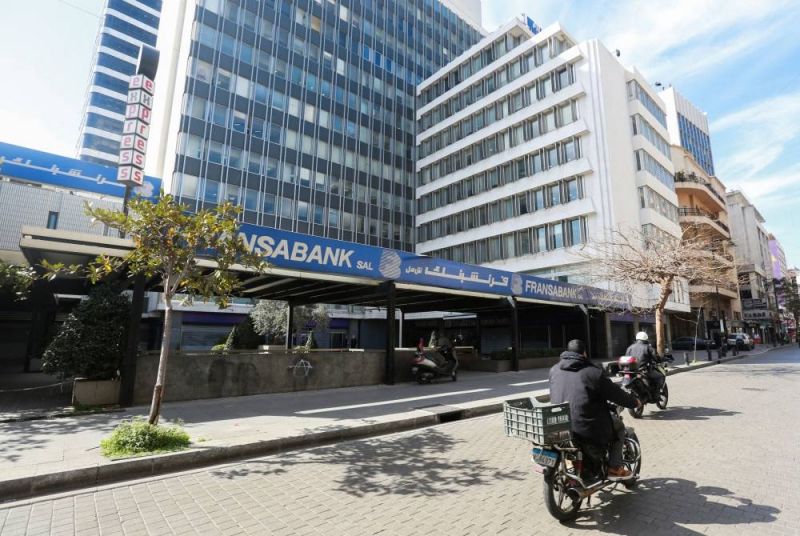
People ride on motorbikes past a branch of Fransabank in Beirut on March 8, 2022. (Credit: Aziz Taher)
Commercial banks are resuming operations today after a two-day “warning strike” that seemed aimed at pressuring the government into protecting the sector from mounting legal scrutiny. Some local media likened the two-day shutdown to an “economic blockade” against residents. The strike followed orders by Mount Lebanon Public Prosecutor Judge Ghada Aoun to freeze the assets of six large banks and those of their board members while she investigates their transactions with the central bank. Prime Minister Najib Mikati summoned the cabinet on Saturday to discuss the moves and tasked Justice Minister Henri Khoury with addressing “shortcomings” in the judiciary.
Families of some of the victims of the Aug. 4, 2020 port explosion filed a lawsuit on Monday against former ministers Ali Hassan Khalil and Ghazi Zeaiter on the grounds of “arbitrariness in using defense rights.” The plaintiffs are seeking a LL100 billion fine in recognition of what they say is the “bad faith” of the two politicians in their use of legal maneuvers to stall the investigation into the port explosion. Khalil and Zeaiter have launched a string of lawsuits over months seeking to remove lead investigator Judge Tarek Bitar, who they accuse of politicizing the investigation, and even other judges who have declined to use their authority to remove Bitar. These lawsuits have contributed to prolonged suspensions of the investigation, which has yet to make its findings public more than one and a half years after the devastating explosion.
The State Shura Council has ruled that a man who removed his sect from his civil registry records, Mohamad Nasser, must be allowed to stand for elections as a candidate. Nasser’s candidacy was initially rejected by the Interior Ministry due to his having removed his sect from his civil registry records, according to a video Nasser posted last week. His political party, the opposition group Citizens in a State (MMFD), brought a complaint to the Shura Council, which accepted his candidacy. “The decision comes to ensure that the choice to remove the sect from papers should not prevent any citizen from exercising their rights, which are guaranteed by the constitution,” MMFD said in a statement. The right of Lebanese citizens to remove their sect from civil registry records was recognized in 2009, with a circular issued by then-Interior Minister Ziad Baroud.
The cabinet is convening this afternoon with a 39-item agenda. The items on the docket include amending the conditions for offshore oil and gas exploration tenders and a presentation on food security from the economy, trade and agriculture ministers. Food security has been a pressing agenda item for the government since the outbreak of war in Ukraine, which is Lebanon’s largest foreign wheat supplier. On Tuesday, it was revealed that Lebanon is planning a tender to import 50,000 tons of wheat from India, with the timing depending on when the Economy Ministry can secure the necessary credit from the central bank. Meanwhile, Lebanon is continuing to consider its options in maritime border negotiations, with all of the implications they hold for offshore oil and gas licensing. The government has just over a week to respond to the latest proposal by American envoy Amos Hochstein, who has been mediating the border dispute with Israel.
In case you missed it, here’s our must-read story from yesterday: “Killon yaani killon” and the case of Marwan Kheireddine”